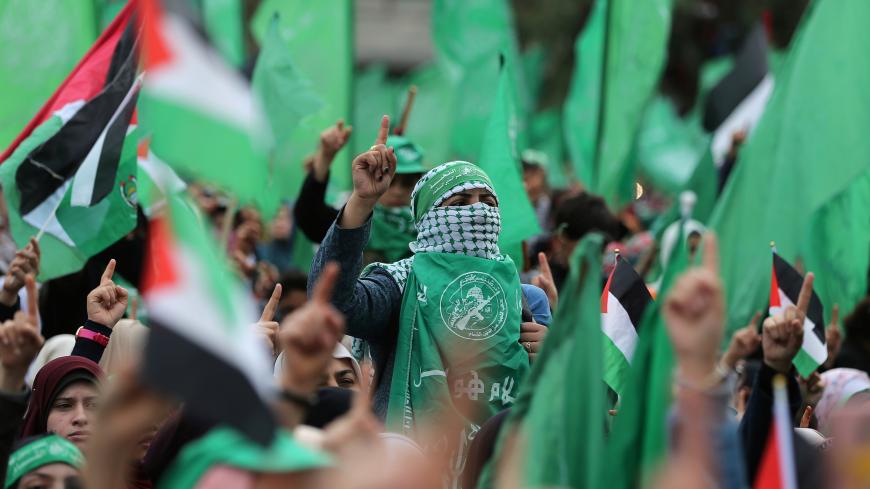In a sudden move, Israel on April 1 expanded the allowed fishing zone off Gaza’s coast to 15 nautical miles around the south near Egypt, and to 12 nautical miles in the center of the strip. The allowed zone, up from 9 miles before a recent closure, is the farthest offshore distance allowed in over two decades.
Israel’s crossings with Gaza — Erez and Kerem Shalom — were opened once again March 31, and the supply of diesel to operate the Gaza power plant has been renewed. Israel is also expected to allow Gaza to increase its exports and imports in the coming days.
These Israeli measures came after Hamas and Israel reached an understanding March 29 whereby Hamas is to keep weekly protests at least 300 meters from the border, prevent the launching of incendiary balloons and kites toward southern Israel and stop the nightly riots in return for an easing of restrictions on the blockaded strip.
According to multiple Hamas sources, major long-term economic projects for Gaza are expected to follow after the Israeli elections, including: upgrading Gaza’s gas and electricity infrastructure with Israeli and Qatari assistance, establishing a trade zone at the Egyptian Rafah border area and a number of commercial and industrial projects there, building solar farms on the outskirts of Gaza, employment programs, and the construction of desalination plants along with other projects.
Many of these programs are going to be funded by Qatar, though a Hamas source told Al-Monitor that other Gulf countries are expected to chip in.
Hamas’ chief Ismail Haniyeh said Israel will lift restrictions on the entry of 30% of the materials it normally blocks; Israel has said the supplies could be also used for building Hamas’ military infrastructure.
Many ordinary Palestinians and most Palestinian factions are suspicious of the agreement and the sudden shift of Israel’s policy toward the coastal enclave.
Almost all Palestinian factions — including Fatah, the Popular Front for the Liberation of Palestine, the Democratic Front, and the Palestinian people’s party, among others — expressed concerns that these upcoming humanitarian plans are a part of the Donald Trump administration’s plans to introduce humanitarian solutions that will come at the expense of a fair political solution to the Palestinian cause.
Senior Palestinian figures have expressed worry that the Trump administration, after it was shut out by Palestinian President Mahmoud Abbas, is trying to circle around and find a gateway for its plans through Gaza.
The United States on a number of occasions has publicly endorsed the efforts of Egypt, Qatar and Israel to rehabilitate Gaza, even though the United States, Israel and Egypt all in the past decade were adamant that the blockade should not be alleviated until Hamas turns over control of Gaza to Abbas. This sudden shift of policy on their behalf is raising doubts, especially among the Palestinians.
Palestinian factions also expressed concerns that the goal behind Israel's acceptance of these projects is to maintain the separation between Gaza and the West Bank, and establish a separate Palestinian state in Gaza, as going back to the 1950s there have been Israeli plans to undermine the Palestinian cause through establishing a Palestinian state in Gaza and possibly expanding it at the expense of the Sinai Peninsula.
Ever since Hamas began talks with Israel outside of the PLO umbrella, the PA has disavowed the talks, accusing Hamas of engaging with Trump’s so-called “deal of the century,” which, the PA said, involves establishing limited self-rule for Palestinians in the West Bank and a Palestinian statelet in Gaza.
On March 28, chief Palestinian negotiator Saeb Erekat said the American recognition of Israeli sovereignty over Jerusalem and the Golan, and granting Israel the right of overriding security control over the West Bank, means that the "next step for Trump is to recognize Israel's sovereignty over the West Bank, beginning with the so-called settlement blocs, and then later an American recognition of a Palestinian state in Gaza.”
Osama al-Qawasmi, a spokesman for Fatah, told Al-Monitor, "Israel and the US seek to liquidate the Palestinian cause through Gaza’s gateway and Hamas' openness to deal with their ideas.”
He said, “Contrary to the PLO’s negotiations with Israel, which were on the basis of land for peace, Israel seeks through these negotiations to separate the Gaza Strip gradually, and provide insignificant humanitarian facilitations in return for preventing the establishment of a Palestinian state.”
Popular Front for the Liberation of Palestine (PFLP) politburo member Mariam Abu Daqqa stressed that the PFLP withdrew from the Gaza’s negotiations with Israel. She told Al-Monitor, “Our position is crystal clear. The Palestinian people have the right to these humanitarian initiatives and have the right to have the blockade removed, but not at the expense of the core issues of the Palestinian cause.”
“Israel’s goal is clear: to separate the West Bank from the Gaza Strip and maintain the Palestinian division,” she said.
“The most efficient and secure way to solve Gaza’s problem is through [national] reconciliation and the implementation of its agreements by Hamas and Fatah,” Abu Daqqa added.
Walid al-Awad, a senor official in the Palestinian People’s Party, said in an April 3 interview with Amad, “We do not exactly trust the Qatari role, which seeks to take these understandings into a different path that goes along with Trump’s Middle East plan, and which will present humanitarian and economic solutions that will come at the expense of the political solution to the Palestinian cause.”
In a Likud meeting March 12, Israeli Prime Minister Benjamin Netanyahu said Israel's decision to allow Qatari funds to be transferred to Hamas is part of a broader strategy to keep Palestinians divided and undermine the possibility of a Palestinian state.
Political analyst Mohammed Qassem told Al-Monitor, “The Trump administration wants to settle the Palestinian issue with a semi-political settlement backed up by humanitarian projects in Gaza and the West Bank. Those projects, funded by Gulf countries, will be the basis upon which the normalization project will kick off as it — the normalization — is a core issue that the Trump administration is desperate to achieve.”
“Aside from separating Gaza from the West bank and Trump’s so-called peace plan, Hamas by accepting these humanitarian projects is risking blessing the normalization project by Palestinian hands in the months to come,” Qassem added.
The Islamic Jihad is also against the Hamas-Israel deal and against any long-term truce in general, as its leaders have long believed that a long-term truce is an Israeli attempt to exclude Gaza from the conflict to maintain its efforts to swallow the West Bank undisrupted.
Haniyeh denied the Palestinian factions’ accusations and stressed that the understandings have no political consequences and that “they have nothing to do with Trump’s deal of the century.” Hamas’ chief also denied that the understandings reached are intended to separate Gaza and the West Bank.
“There are those who said that Egypt is taking Hamas toward the establishment of a permanent separate political entity in Gaza, and we say that Egypt has not and will not do so, and its position is clear on the necessity of Palestinian territorial unity,” Haniyeh said.
Egypt under President Abdel Fattah al-Sisi two years ago mended its ties with Hamas, despite the fact that it accused the Islamist movement in 2013 of being a co-conspirator against the security and stability of the Egyptian people.
There has been wide speculation that Egypt mended its ties with Hamas upon instructions from the Trump administration. Trump recently announced that he has invited Sisi to visit the United States soon, ahead of the release of his upcoming Middle East plan slated for after the April 9 Israeli elections.
UN envoy Nickolay Mladenov, who has been helping to advance humanitarian initiatives to Gaza stressed in a statement he released that the core of the crisis in Gaza remains political, and that advancing intra-Palestinian reconciliation remains essential.
“I reiterate that there can be no state in Gaza, and there can be no state without Gaza. Ultimately, only sustainable political solutions will reverse the current negative trajectory and restore hope to Gaza’s long-suffering population,” Mladenov said in the statement.







